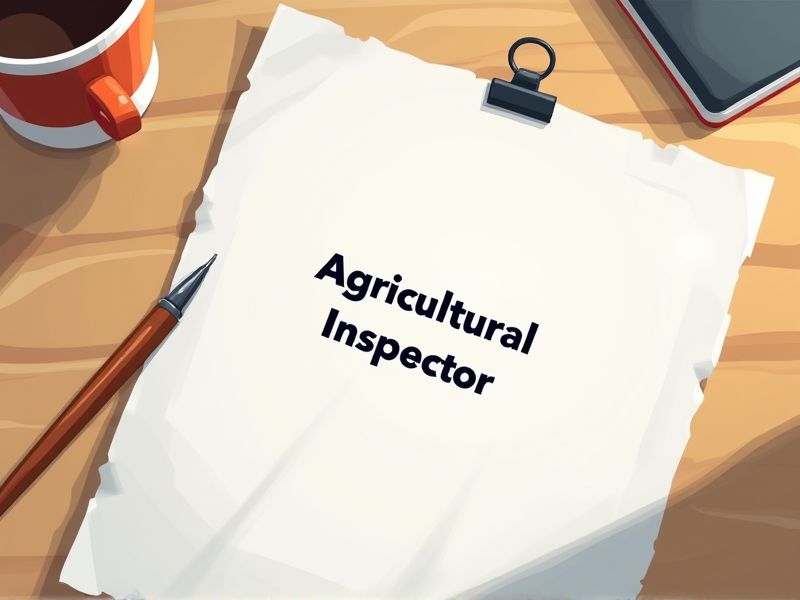
Agricultural Inspectors play a critical role in ensuring food safety and quality, directly impacting public health. Certifications are essential for verifying that inspectors have the necessary knowledge to identify and manage agricultural risks effectively. Without proper certification, inspectors might overlook significant issues, leading to economic losses or health hazards. Key certifications you may need for an Agricultural Inspector include those specific to food safety protocols and pesticide regulations.
Certified Pesticide Applicator License
An Agricultural Inspector must hold a Certified Pesticide Applicator License because it ensures they understand the proper handling and application of pesticides, crucial for maintaining crop safety. This certification validates their ability to adhere to state and federal regulations, thus preventing harmful chemical misuse. By having this license, inspectors demonstrate expertise in minimizing environmental impact and protecting public health. The license also supports their role in educating and guiding farmers on safe pesticide practices, promoting sustainable agriculture.
Certified Crop Adviser (CCA)
Certified Crop Advisers possess specialized knowledge in crop production, which aids Agricultural Inspectors in ensuring compliance with agricultural regulations. Their expertise in soil health and pest management supports effective inspection processes. Data-driven insights from CCAs contribute to sustainable agricultural practices, aligning with environmental standards. Collaboration with CCAs enhances the accuracy of assessments and optimizes crop quality and yield.
Food Safety Manager Certification
Food Safety Manager Certification ensures agricultural inspectors have the necessary knowledge to identify and manage potential food safety hazards. This certification enhances their ability to enforce regulations that protect public health by maintaining high standards in food production. Agricultural inspectors with this certification can effectively communicate best practices to farm workers and producers. The certification helps in reducing incidence of food-borne illnesses by promoting uniform safety standards across the agricultural sector.
Good Agricultural Practices (GAP) Certification
Good Agricultural Practices (GAP) Certification ensures that agricultural inspectors have a verified benchmark for assessing food safety and sustainability standards on farms. Having GAP Certification allows inspectors to confidently validate that farming operations minimize pesticide residues, ensuring consumer safety. GAP Certification provides a standardized framework that inspectors can use to evaluate environmental stewardship and resource conservation practices. By requiring GAP Certification, agricultural inspectors maintain credibility and trust, reinforcing supply chain integrity and market access for producers.
Hazard Analysis and Critical Control Points (HACCP) Certification
HACCP Certification enables agricultural inspectors to systematically identify potential hazards in food production, ensuring consumer safety. By understanding critical control points, inspectors can effectively minimize risks of contamination in agricultural processes. Certification provides credibility and encourages transparency, fostering trust between agricultural producers and their clients. This qualification also equips inspectors with globally recognized standards, facilitating compliance with international food safety regulations.
OSHA 30-Hour General Industry Certification
Agricultural inspectors require OSHA 30-Hour General Industry Certification to ensure they are well-versed in safety regulations crucial for minimizing environmental hazards. This certification provides comprehensive training on workplace safety standards, reducing the likelihood of accidents and injuries among agricultural workers. Knowledge gained from OSHA 30 helps inspectors identify potential violations, enhancing compliance and protecting public health. Familiarity with OSHA protocols empowers inspectors to implement effective safety strategies that benefit both workers and agricultural operations.
Agricultural Safety and Health Certification
Agricultural Safety and Health Certification for an Agricultural Inspector ensures they are equipped with the knowledge to identify and mitigate potential hazards in farming environments. This training enhances the inspector's ability to enforce regulations that protect workers from accidents and illnesses. A certified inspector is more credible, instilling confidence in farmers and workers regarding compliance and safety standards. Certification keeps inspectors updated with the latest safety protocols and methodologies, promoting a healthier agricultural sector.
Integrated Pest Management (IPM) Specialist Certification
An IPM Specialist Certification equips agricultural inspectors with the knowledge to effectively manage and mitigate pest populations, reducing reliance on chemical pesticides. With certification, inspectors can implement sustainable agricultural practices, leading to healthier ecosystems and food systems. Certification also ensures that inspectors are conversant with the latest pest control strategies, minimizing crop damage and loss. Adopting IPM standards helps in improving public health by promoting the use of safer pest management techniques.
EPA Agricultural Water Management Certification
The EPA Agricultural Water Management Certification equips agricultural inspectors with the necessary knowledge to ensure water quality and efficiency in farming practices. Without this certification, inspectors may lack standardized guidelines, leading to inconsistent evaluations of water-related practices. Enhanced skills in water management contribute to sustainable agricultural practices and compliance with environmental regulations. This certification reduces the risk of water-related contamination affecting crop safety and public health.
Agricultural Inspection Specialist Certification
The Agricultural Inspection Specialist Certification ensures that agricultural inspectors are knowledgeable about current standards and regulations, directly affecting their ability to enforce compliance effectively. It provides inspectors with specialized training to identify potential risks, which contributes to the prevention of harmful practices in the agricultural sector. The certification enhances credibility and trust between inspectors and producers, fostering smoother communication and cooperation. Certified inspectors are more likely to detect and address issues efficiently, reducing the likelihood of food safety incidents and boosting public confidence in agricultural products.
Summary
When you, as an Agricultural Inspector, acquire certain certifications, you enhance your credibility and expertise. This can lead to more job opportunities and potentially higher salary offers, reflecting an industry's trust in your skills. Your certifications can drive improved inspection accuracy and efficiency due to advanced knowledge and training. Organizations often benefit from reduced compliance risks when employing certified inspectors, supporting their operational effectiveness.
